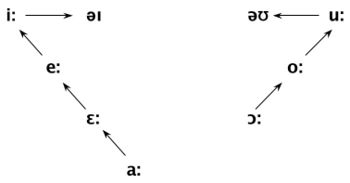The Early Modern English Period: Porovnání verzí
Značka: editace z Vizuálního editoru |
Značka: editace z Vizuálního editoru |
||
| Řádek 7: | Řádek 7: | ||
* most significant of all phonological developments in English | * most significant of all phonological developments in English | ||
* change in pronunciaion of verb tense<ref>glottopedia.org</ref>[[File:350px-GVS.jpg|400px]] | * change in pronunciaion of verb tense<ref>glottopedia.org</ref>[[File:350px-GVS.jpg|400px]] | ||
| + | 6. '''What kind of social relationship does the usage of singular you and thou reflect in Elizabethan society?''' | ||
| + | * used to express power relations | ||
| + | * ''thou ''becoming an exceptional form | ||
| + | * ''you ''used in order to show respect (everyone regarded due to his/her social status) | ||
| + | ** children addressing their parent as ''you ''and being addressed as ''thou'' | ||
| + | * Bruti: use of you/thou based on social distance and emotional attitude | ||
| + | ** inferiors addressed as ''thou'', equals as ''you/thou'' and superiors as ''you'' | ||
| + | ** anger/contempt or familiarity/intimacy expressed by the use of ''thou'', neutrality/indifference with ''you'' | ||
Verze z 31. 3. 2015, 13:11
4. What subsystems of English (such as e.g. spelling) were most strongly affected by the process of standardisation in this period?
5. The Great Vowel Shift [1]
- mismatch between spelling and pronunciation: begun in ME, spelling fixed by early XVI century, but the sound kept changing).
- change of quality of all long vowels (stressed syllables)
- standardization of the language: synthetic -> analytic
- most significant of all phonological developments in English
- change in pronunciaion of verb tense[2]

6. What kind of social relationship does the usage of singular you and thou reflect in Elizabethan society?
- used to express power relations
- thou becoming an exceptional form
- you used in order to show respect (everyone regarded due to his/her social status)
- children addressing their parent as you and being addressed as thou
- Bruti: use of you/thou based on social distance and emotional attitude
- inferiors addressed as thou, equals as you/thou and superiors as you
- anger/contempt or familiarity/intimacy expressed by the use of thou, neutrality/indifference with you